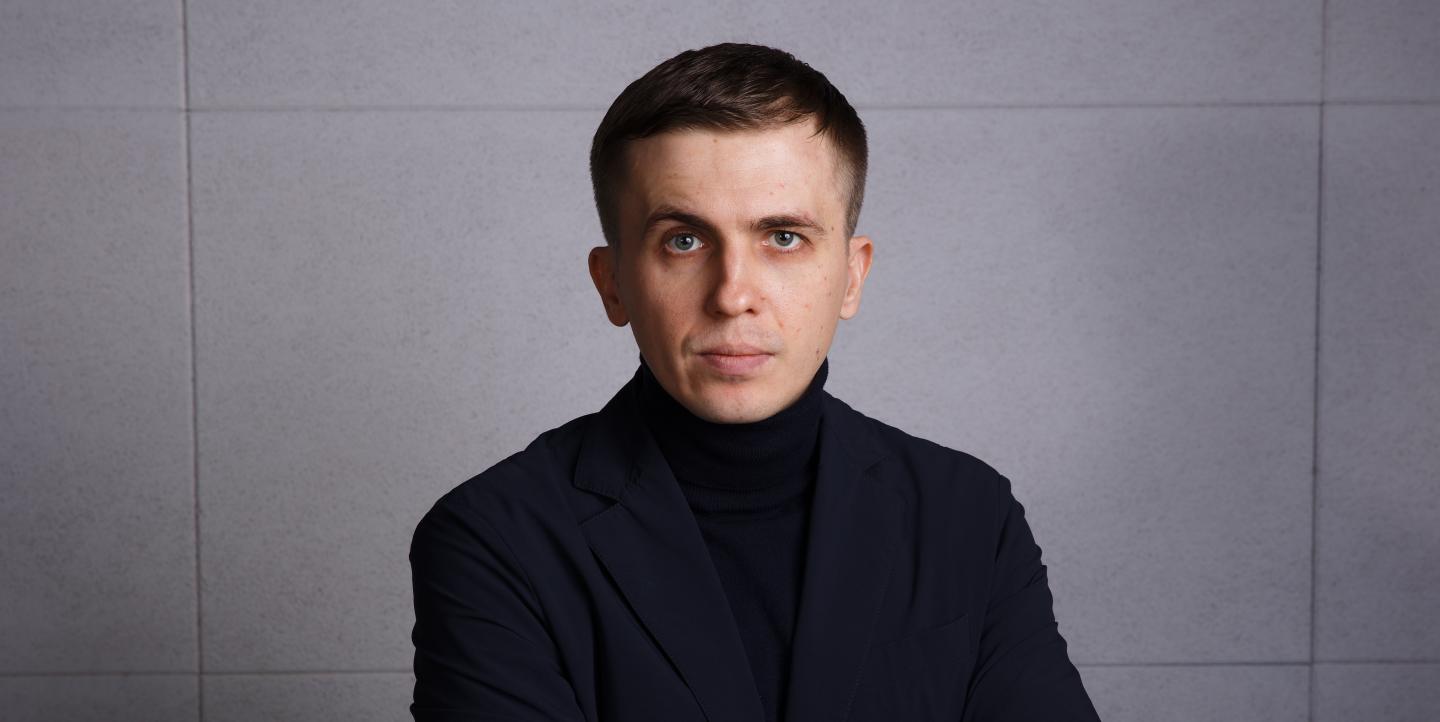Mykhailo Tkach was built to defend justice. The Ukrainian journalist is persistent and fearless, driven to pick apart webs of corruption and collusion.
When Russia launched its full-scale invasion of his home country, Tkach’s career and life changed drastically – but he was prepared. Most waking hours are working hours for Tkach, the head of investigations at Ukrainska Pravda, and he embraced the newfound pressure.
Amid phone tappings, threats to his newsroom and constant violence around the country, he and his team fortify Ukraine in its fight to preserve its sovereignty by shining a constant light on Russia’s actions and keeping Ukrainian citizens informed.
Tkach has detailed Russian wartime trade routes, tracked down Ukrainian officials vacationing despite travel bans and exposed financial scandals of Ukrainian millionaires across Europe. His investigations have amassed millions of views as they hold the powerful to account.
Meet Mykhailo Tkach, IJNet’s journalist of the month for October:
What sparked your interest in journalism?
At my core, I have always valued justice. I’ve had a strong sense of fairness and a deep aversion to corruption, violations [of] rights and abuses of power at both the local and national levels.
While studying at Oles Honchar Dnipro National University, I realized journalism was my calling. Back in my hometown of Dnipro, I began developing my distinct journalistic style — fact-based, measured and sprinkled with irony. This style became second nature, shaping the way I live and work today. I’m very structured by nature, and from my days as a student, I have always viewed time as a valuable asset. I became used to working long hours — 12 to 14 hours a day — which is even more necessary now amid Russia’s full-scale invasion of Ukraine.
Describe your career path. What led to you becoming head of investigations at Ukrainska Pravda?
While still in university, I gained practical experience in television at the local Channel 9 in Dnipro. After graduation, I joined 1+1 TV in Kyiv. Later, I spent five demanding years working on the investigative program Schemes: Corruption in Detail, a project by the Ukrainian service of Radio Free Europe/Radio Liberty. Many of the investigations I produced during that time had a significant public impact by exposing major corruption cases among Ukraine’s political elite.
What has always driven me is the desire to disseminate information widely and ensure [the] public [has] access to it. That’s what led me to pursue video formats and specialize in investigations of high-level corruption.
I strongly believe that our work at Ukrainska Pravda has an impact — changing society for the better, preventing corruption and promoting justice. Since 2021, I have had the honor of leading the investigative journalism department at Ukrainska Pravda, Ukraine’s largest and oldest online media outlet. Founded 24 years ago, it now publishes both Ukrainian and English-language content and maintains an active YouTube channel. Our mission is to serve the public by delivering the truth.
Ukrainska Pravda is the most popular independent media outlet in Ukraine, reporting 24/7 on the war, Russian aggression, government affairs, European integration and political and social developments.
How do you use IJNet? What kind of support does it provide?
IJNet is one of the most popular resources among professional journalists. It’s a vibrant community and a reliable source of information. At Ukrainska Pravda, we often use it to explore opportunities for participation in conferences, forums and grant projects.
Our ongoing partnership with IJNet also helps us spread the word about our initiatives. For example, the public announcement of the Bucha Journalism Conference helped us attract international participants to the event.
How has your life and work changed since the beginning of the full-scale Russian invasion?
The war is intensifying my work as an investigative journalist, and I am also actively engaging in volunteer efforts supporting Ukraine’s Armed Forces. Our journalistic community is under constant pressure — my phone [has been] tapped, and our newsroom often receives anonymous threats. This pressure tends to increase after we publish major investigations.
However, every attempt by officials to interfere with Ukrainska Pravda only strengthens our resolve to expose corruption and inefficiency at the highest levels of government.
What advice would you give to journalists working in conflict zones?
There’s a joke among Ukrainian investigative journalists: “Crime is organized, corruption is systemic, but you’re not.” My advice? Be systematic and organized.
Use your time efficiently and avoid procrastination. Build networks and delegate tasks. Lean on networks of investigative journalists within your country or region. Don’t try to do everything on your own. While you’re on the ground or out on assignment, let a professional analyst work with registers and databases back at the office, and have an experienced editor prepare the video for publication.
Only through the synergy of your team can you produce high-quality investigations that truly make a difference in society.
Photo courtesy of Mykhailo Tkach.


